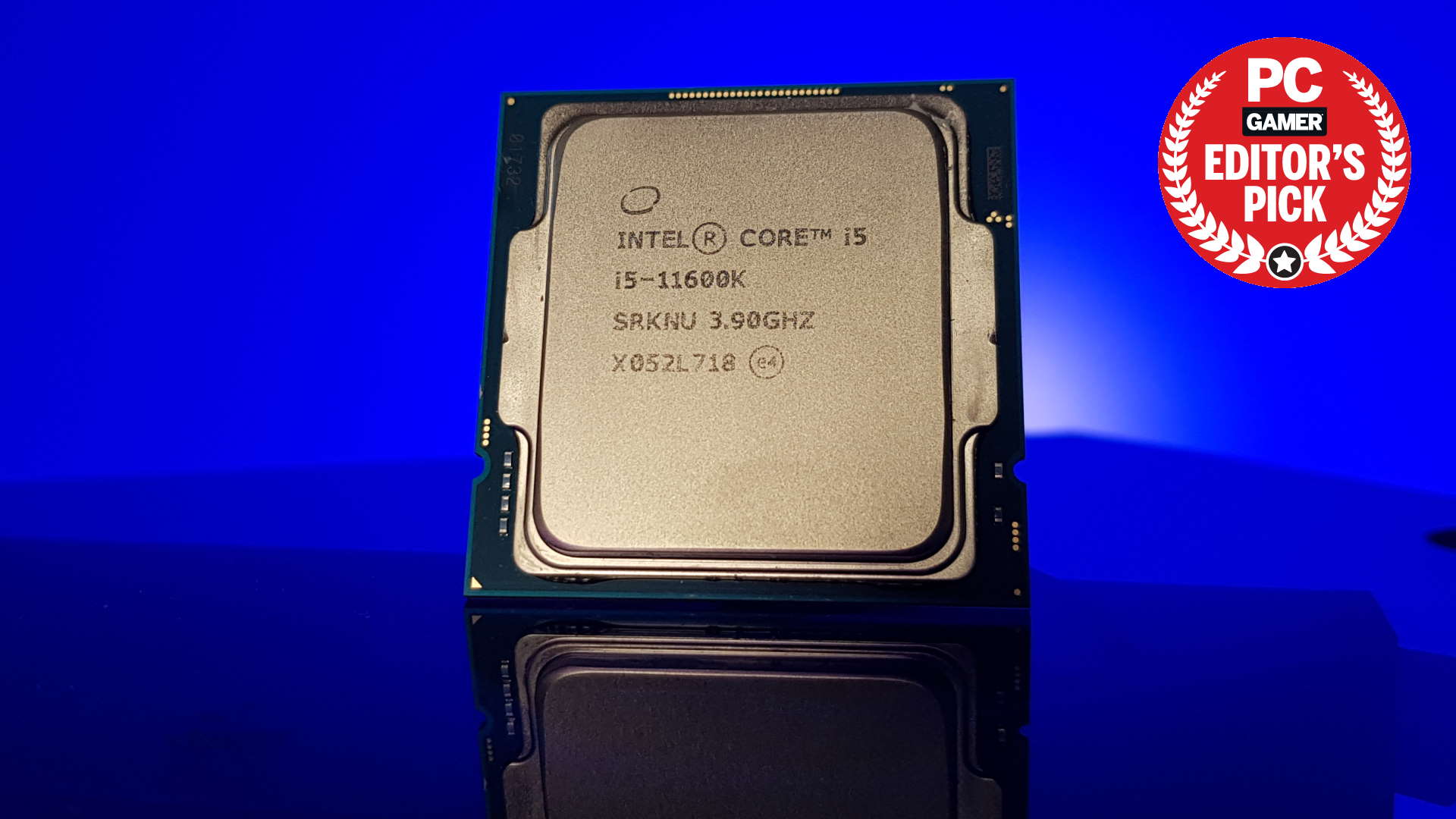Our Verdict
Intel's making a real play for the volume end of the market with one of the best Core i5 chips it's released in a long time. The i5 11600K is a great mainstream gaming CPU that can get the most out of any graphics card you can pair it with.
For
- Undercuts 5600X on price
- High-end gaming performance
- Solid multithreading chops
Against
- Weak PCIe 4.0 support
- Power hungry
PC Gamer's got your back
I reckon the Intel Core i5 11600K is Pat Gelsinger's favourite CPU in this new 11th Gen Rocket Lake lineup, it's certainly mine so far. Intel's new CEO has been speaking at length recently about his desire for the company to return to its heyday, a return to the tick-tock CPU production cadence of yesteryear, and to putting engineering at the forefront of everything the company does.
And the i5 11600K has a little of the nostalgia chip about it to me, itself a return to the days when our recommendation around a new CPU architecture would inevitably fall to the Core i5 CPUs rather than the top-end i7. In this case it's a real strong recommendation over the lacklustre Intel Core i9 11900K as well as the i7 11700K.
This is one of the only new processors that should interest PC gamers from Intel's 11th Gen desktop CPUs, and is probably the go-to chip for anyone looking to build a mainstream gaming PC today. Y'know, if you can find a graphics card to go with it, anyways.
Previously that recommendation was strictly pointed at the latest hex-core AMD chip, the Ryzen 5 5600X. But now, I'm not so sure.
Specs
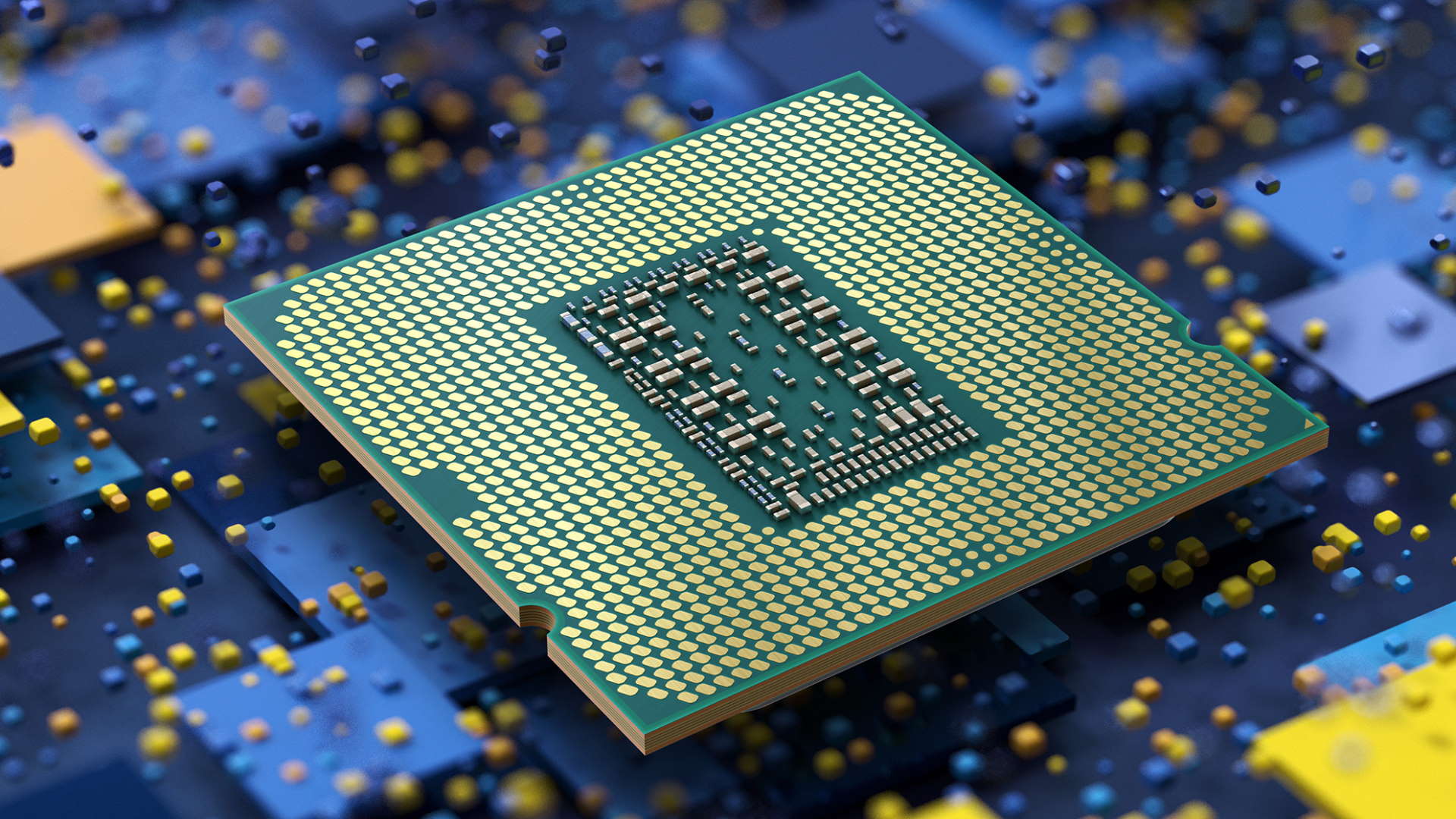
What's inside the Intel Core i5 11600K?
This is Intel's top-end six-core CPU from the Rocket Lake range, offering solid clock speeds, HyperThreading, unlocked multipliers for making with the overclockering, and a $270 price tag that makes the $350 Ryzen 5 5600X look positively pricey.
It's a different proposition within the 11th Gen lineup compared to the 11900K too. Where the Core i9 is weaker, on paper, against its last-gen equivalent—with fewer cores, and a lower overall clock speed—the Core i5 11600K improves on its 10th Gen forebear almost across the board.
Cores: 6
Threads: 12
Base clock: 3.9GHz
All-core boost: 4.6GHz
Single-core boost: 4.9GHz
Smart cache: 12MB
TDP: 125W
Memory support: DDR4-2933 (Gear 1), DDR4-3200 (Gear 2)
Price: $270
The only point it doesn't is in the almost irrelevant base clock figure of 3.9GHz. The Core i5 10600K has a nominally higher 4.1GHz base, but you never really see that in use anyway. But the all-core figure of 4.6GHz (which you do see solidly in multithreaded workloads) and the 4.9GHz single-core number are both one step higher than the Comet Lake i5.
It's also got that PCIe 4.0 support baked into the CPU itself, though sadly not throughout the new Z590 chipset. We've not had the greatest experience with PCIe 4.0 performance from the Rocket Lake chips so far, neither from the top-end Core i9 or this i5 11600K. The ups and downs in our performance testing with the 11th Gen CPUs, however, do make us think this could be down to teething problems surrounding Intel's inaugural PCIe 4.0 platform.
Benefit of the doubt, and all that.
That doesn't change the fact that Intel's 500-series motherboards don't themselves support it from the chipset, and that reduces the effectiveness of the platform as a whole. Maybe that's not a deal-breaker right now, but with the dropping prices of PCIe 4.0 SSDs it's going to be the connection of choice going forward.
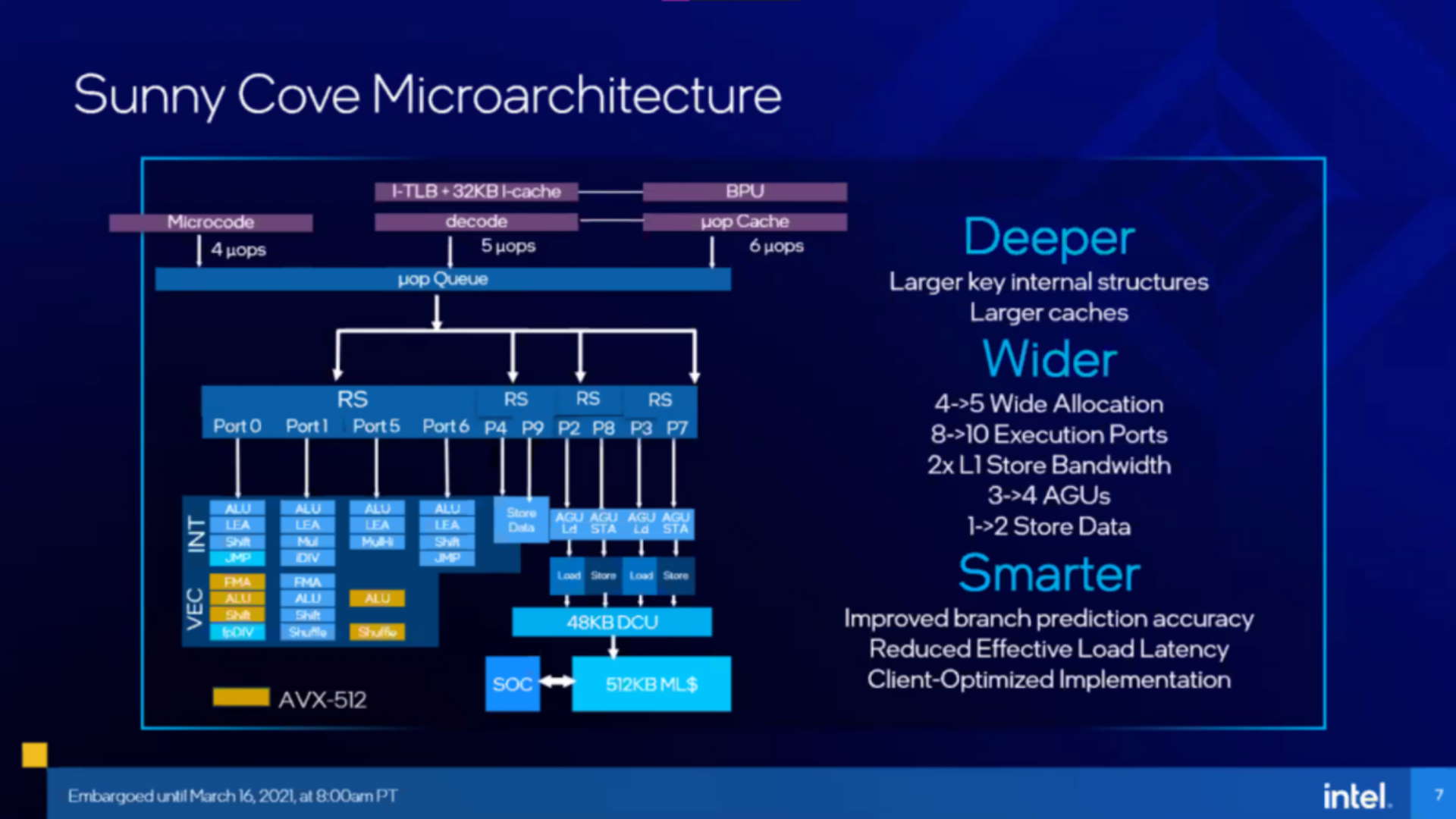
But with Rocket Lake this is more than simply a higher-clocked version of the Comet Lake i5, it's actually a whole new architecture. Intel's desktop chips have been stuck on slight iterative updates of the 14nm Skylake core design released in 2015, but for this 2021 launch it has pulled the 10nm Sunny Cove design out of its last-gen Ice Lake mobile CPUs and back-ported that into its mature 14nm production process.
Intel has also dropped in the Xe GPU architecture that debuted within its latest Tiger Lake mobile processors. There are fewer execution units (EUs) inside the desktop version (32 vs 96), but honestly that's of little consequence to gamers who will be jamming a discrete GPU alongside their new processing silicon. Usual graphics card stock caveats apply.
That all means you're getting a hefty IPC increase of some 19 percent over the previous desktop CPUs, as well as some smarter silicon to go along with the vagaries of Intel's PCIe 4.0 support. That extra performance is the upside, the downside is that you lose the areal and efficiency benefits the smaller 10nm node offers, resulting in a bigger, hotter, and more power hungry chip.
Benchmarks
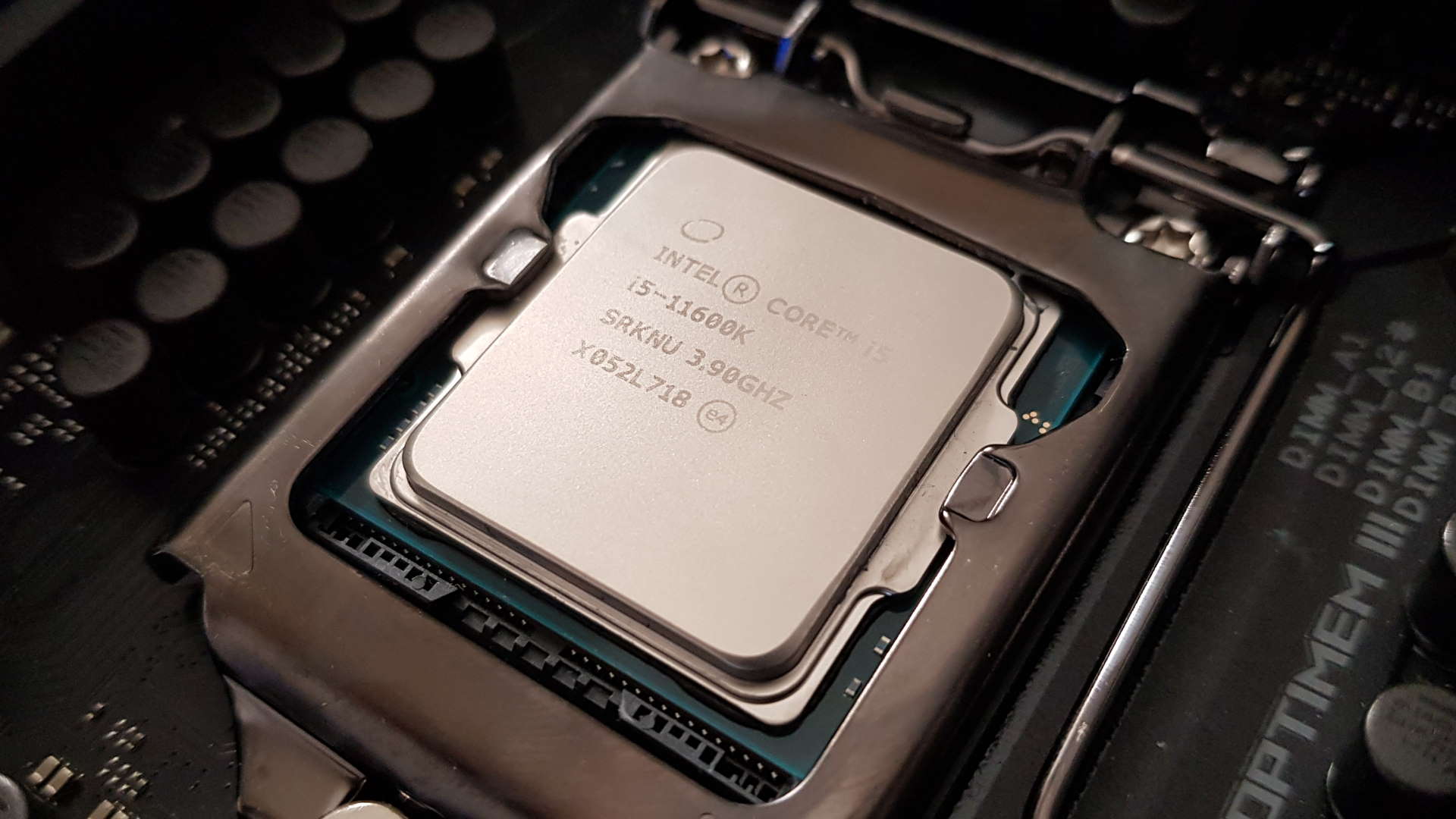
How does the Intel Core i5 11600K perform?
The main aim of the flagship Core i9 11900K was to retake the lead at the top of the gaming CPU market, to push ahead of the AMD Ryzen competition for better or worse. And while it does so from a raw frame rate perspective the actual relative processing performance, platform, and value proposition of the top Rocket Lake chip falls far behind what the Ryzen 9 5900X and Ryzen 7 5800X can offer.
But this is far more like it. As a mainstream six-core CPU, the Core i5 11600K is pointing itself directly at AMD's equivalently specced Ryzen 5 5600X, and here the benchmark battle across the board is a far more even contest.
In gaming, the i5 11600K is generally capable of offering practically identical performance to the 5600X, give or take a few frames per second here and there. It's also almost up there in comparison to Intel's i9 11900K too. Suffice to say, this is a more than capable gaming processor that won't stand in the way of your graphics card's ability to render its silicon butt off.
Gaming performance
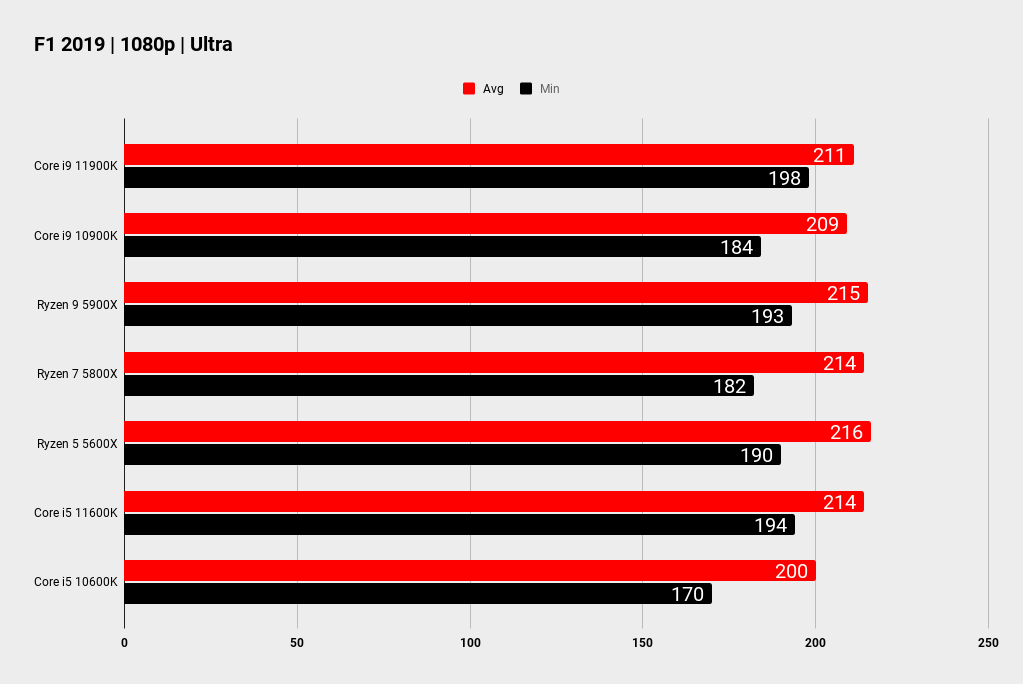
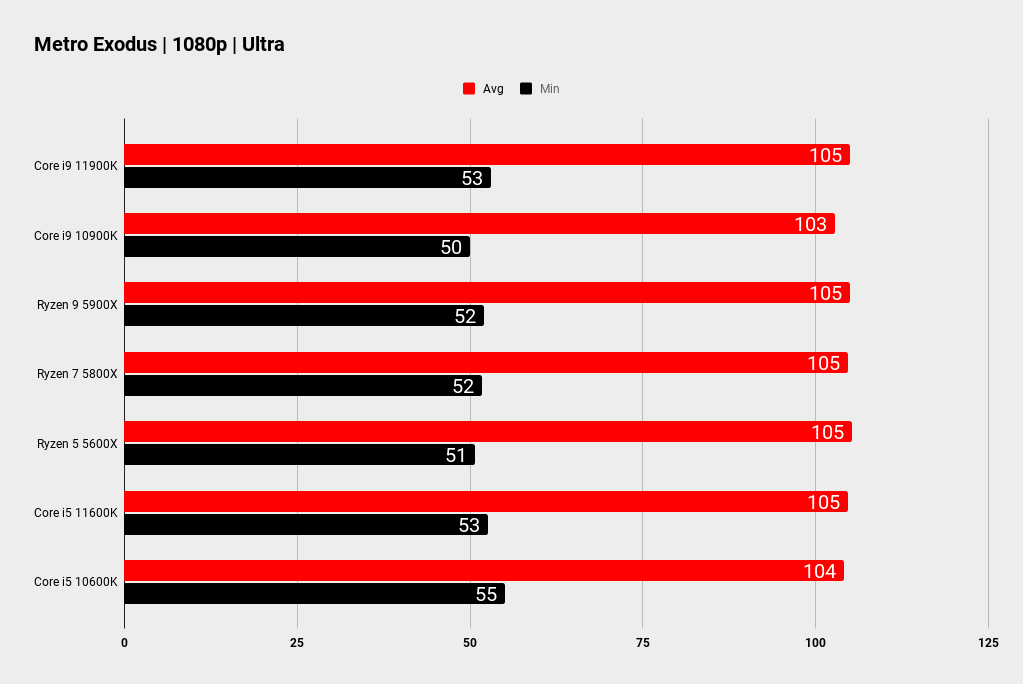
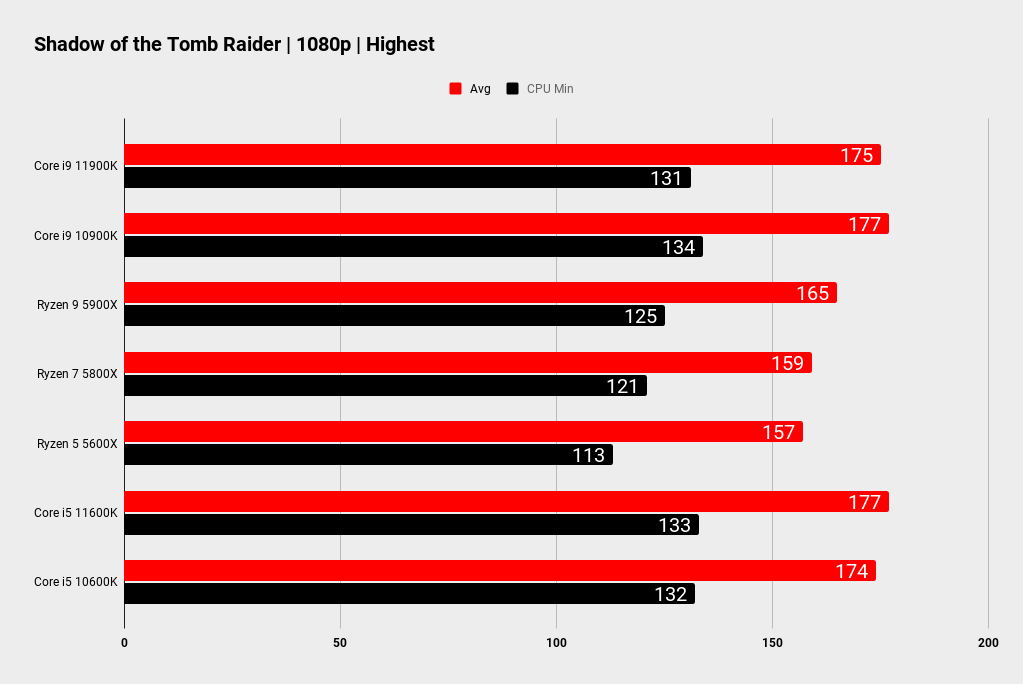
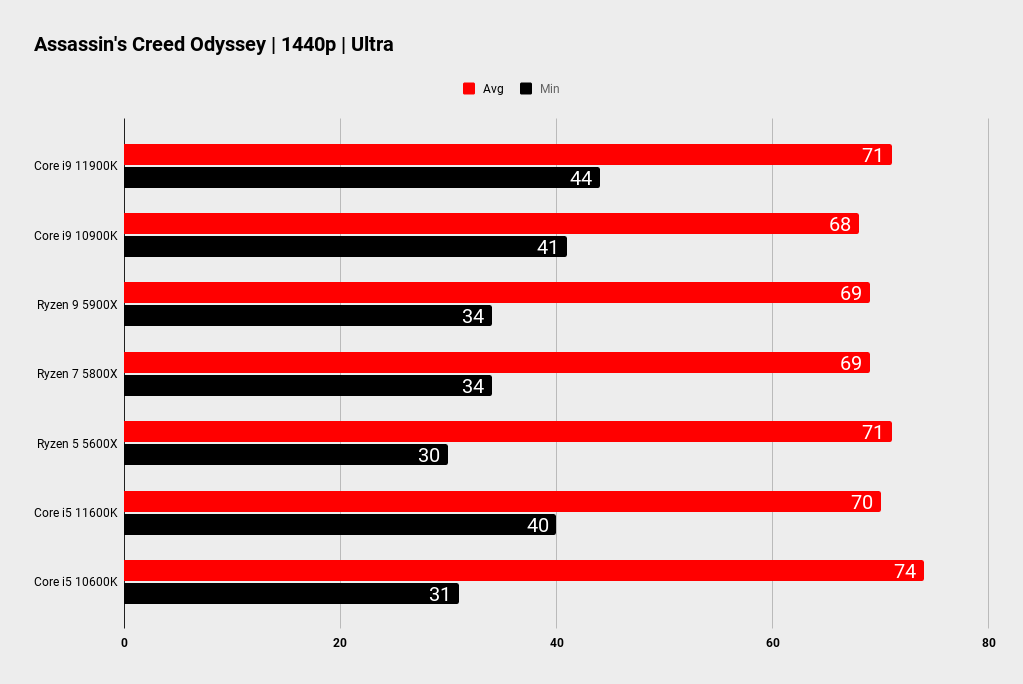
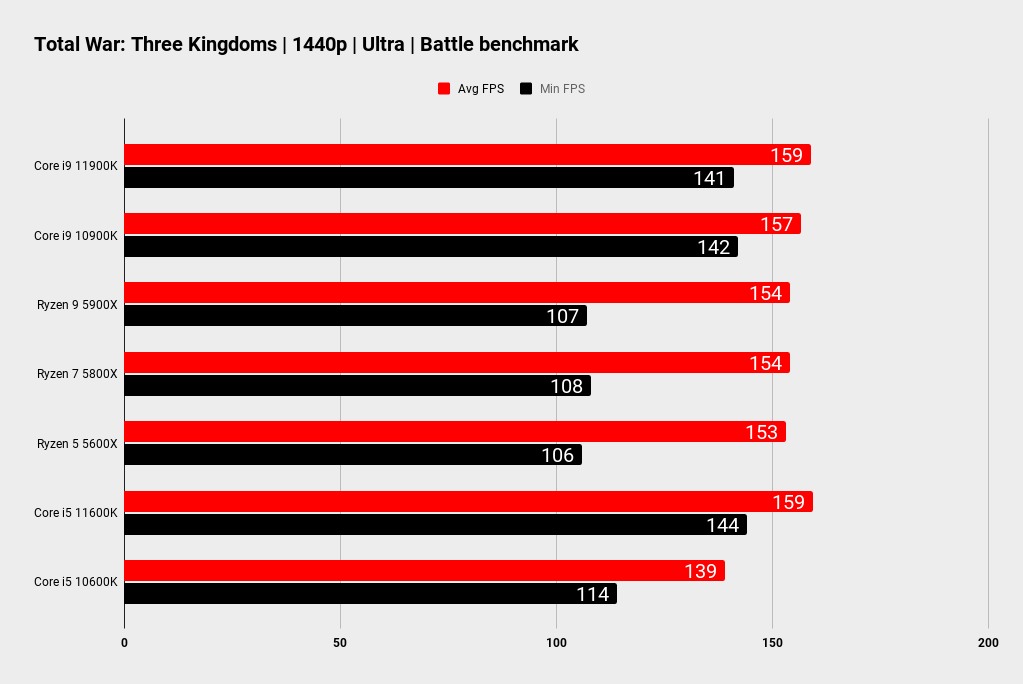
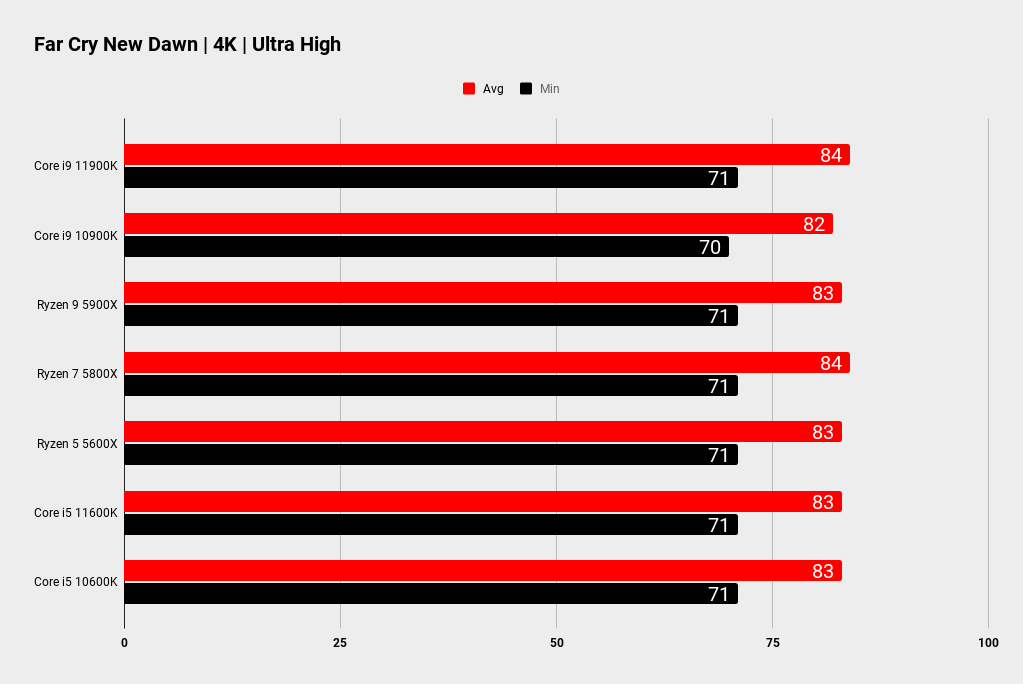
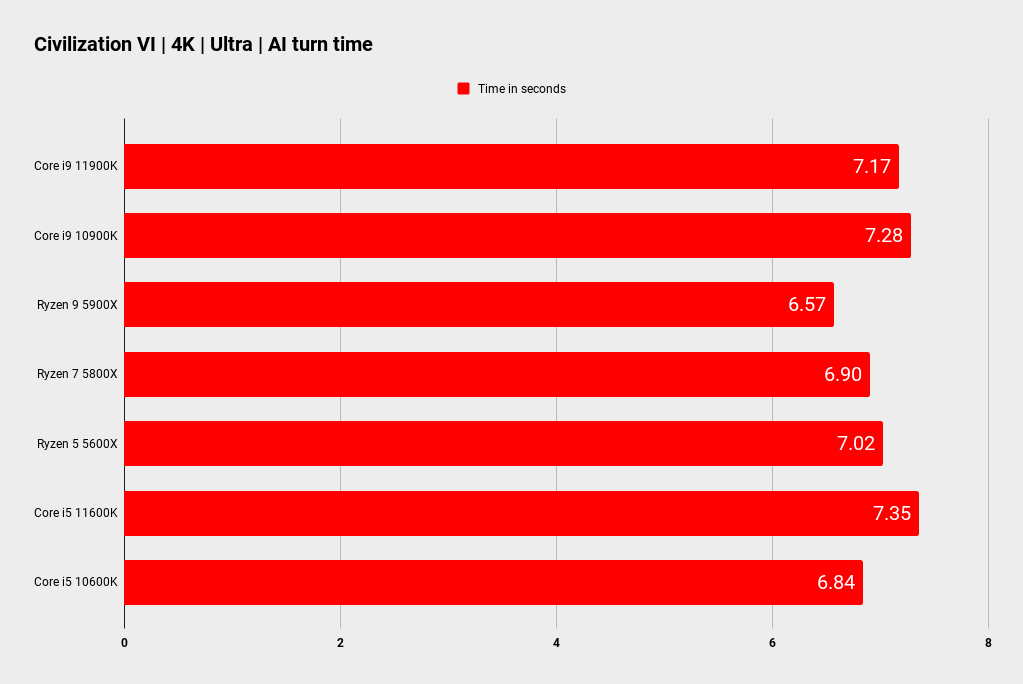
But where that was all the Rocket Lake i9 could offer, the i5 11600K goes toe-to-toe with the 5600X in the rest of our benchmarking suite. It's a shade off in our CPU-intensive X264 and Cinebench tests, but not by much at all, and is well ahead when it comes to memory.
Though that is something to say about the Rocket Lake i5. Intel has introduced a gearing system for its memory, where if you decouple the 1:1 ratio of the memory controller (known as Gear 1) you will be able to achieve higher frequencies with a 1:2 ratio (known as Gear 2). As standard the i5 will run at Gear 1 up to DDR4-2933 and Gear 2 for DDR4-3200.
System performance
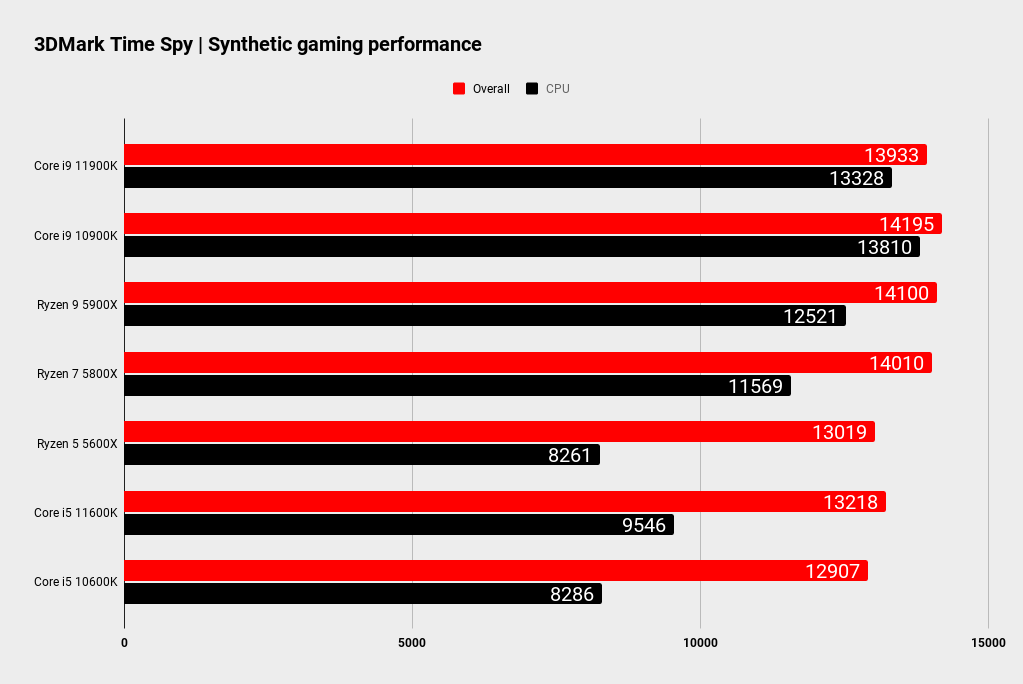
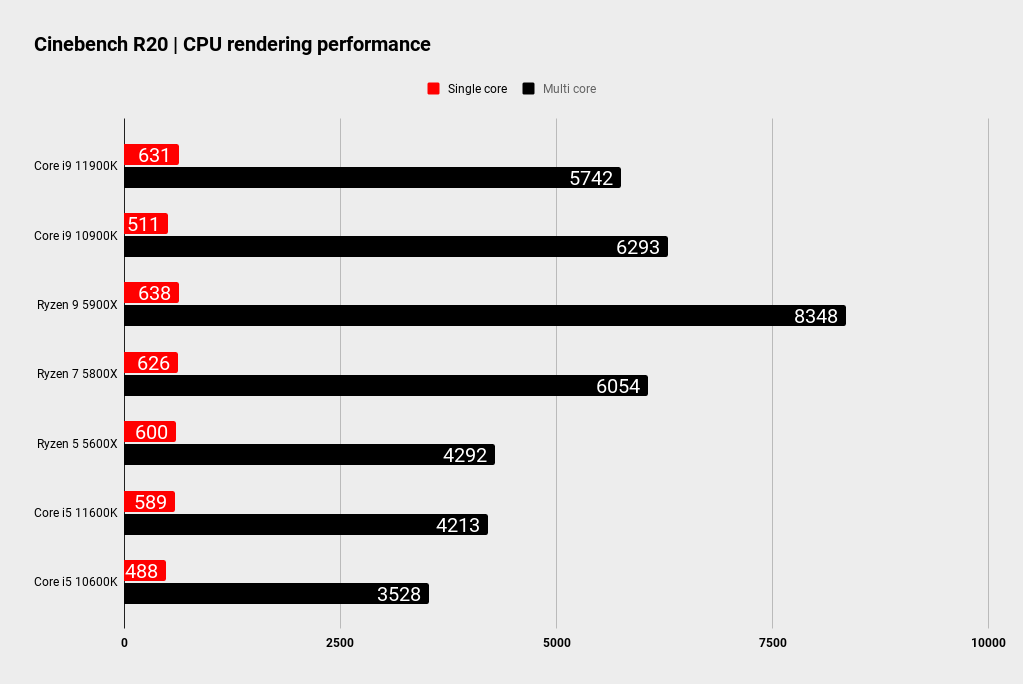
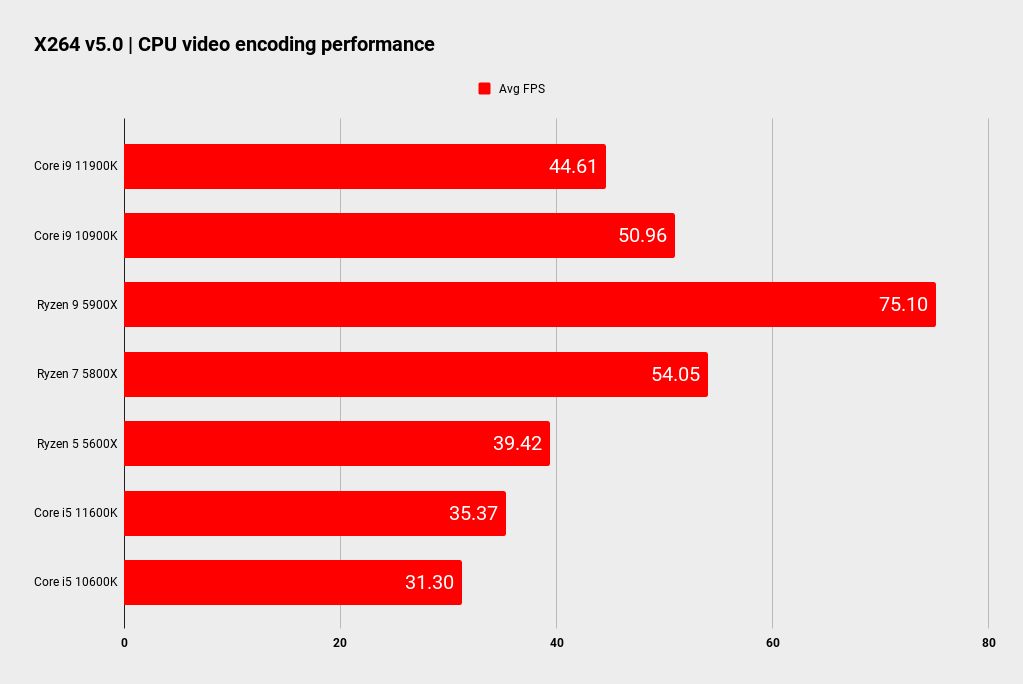
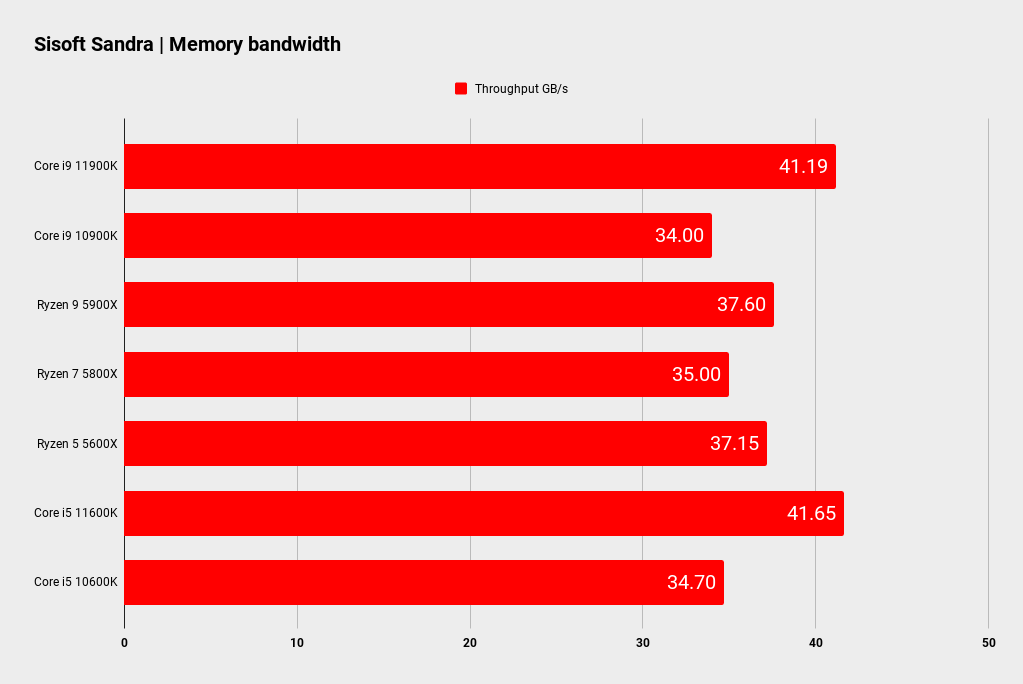
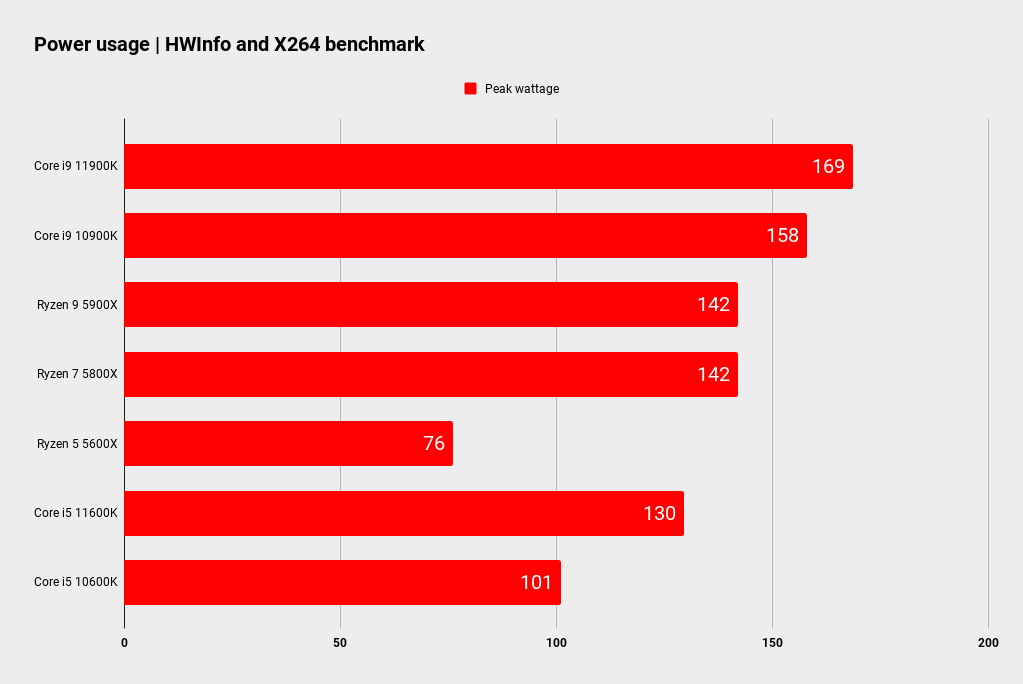
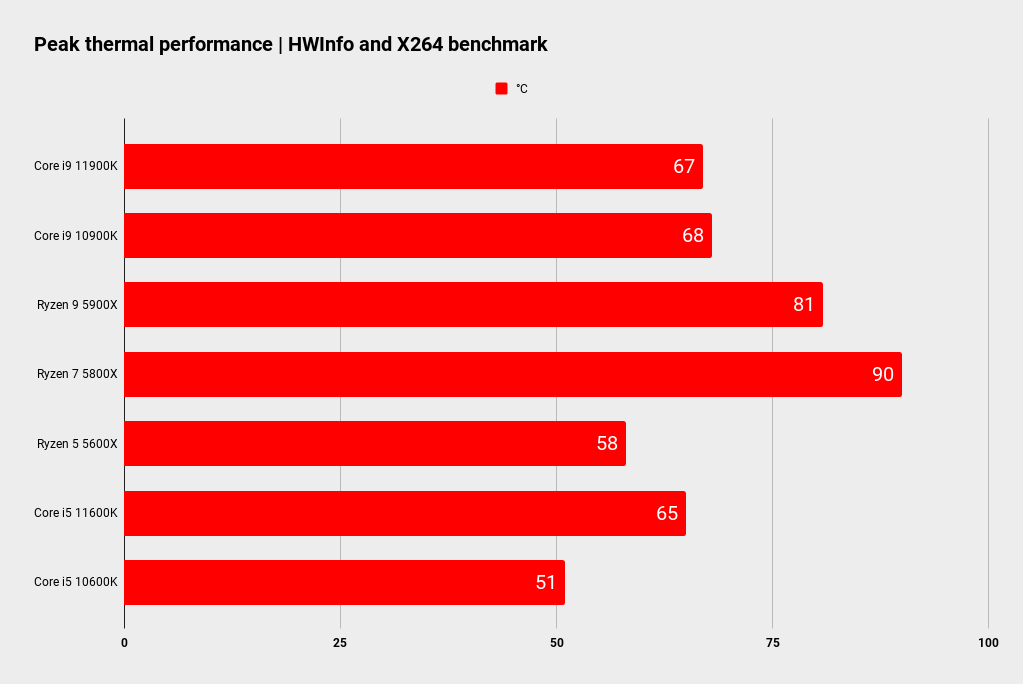
Intel motherboard: Asus ROG Maximus XIII Hero
Chipset: Z590
AMD motherboard: Gigabyte X570 Aorus Master
Memory: Corsair Vengeance RGB Pro 32GB @ DDR4-3200
GPU: Nvidia RTX 2080 Ti
Storage: 2TB Kioxia Exceria Plus
CPU Cooler: Corsair H100i RGB Pro
PSU: NZXT 850W
Chassis: DimasTech Mini V2
Monitor: Philips Momentum 558M1RY
But as Intel's chips have been capable of running up to 3,200MHz with the original 1:1 ratio (and was always above rated spec in our testing) that's what our CPU benchmarks are running with. With that standard setting the 11600K achieves memory bandwidth of 41.65GB/s, but if you switch to Gear 2 that drops by a third to just 27.67GB/s. Something to bear in mind if you're chasing frequency numbers for the hell of it, and something to definitely check on after you enable your XMP settings in the BIOS.
The only place where there is a significant delta between the Core i5 11600K and the Ryzen 5 5600X is when it comes to power. The 7nm Zen 3 architecture is seriously efficient, and that is able demonstrated by the chip's peak wattage of just 76W. The Rocket Lake i5 by comparison hits 130W, and actually considerably more if you push it in multithreaded workloads. That right there is the main compromise of this 14nm back-port.
That's likely why overclocking is such a struggle with Rocket Lake. Again I got very little change out of bumping up the clocks on our 11600K sample, though I was at least able to get a solid 4.9GHz all-core setting. With a little judicious undervolting it was also running pleasingly cool, and without getting too testy in terms of power draw. Though 5GHz was right out.
Others will likely be able to get more out of their chips than me with my limited OC nouse, but it's not going to be a universal overclocking champ for the masses, that's for sure.
Analysis
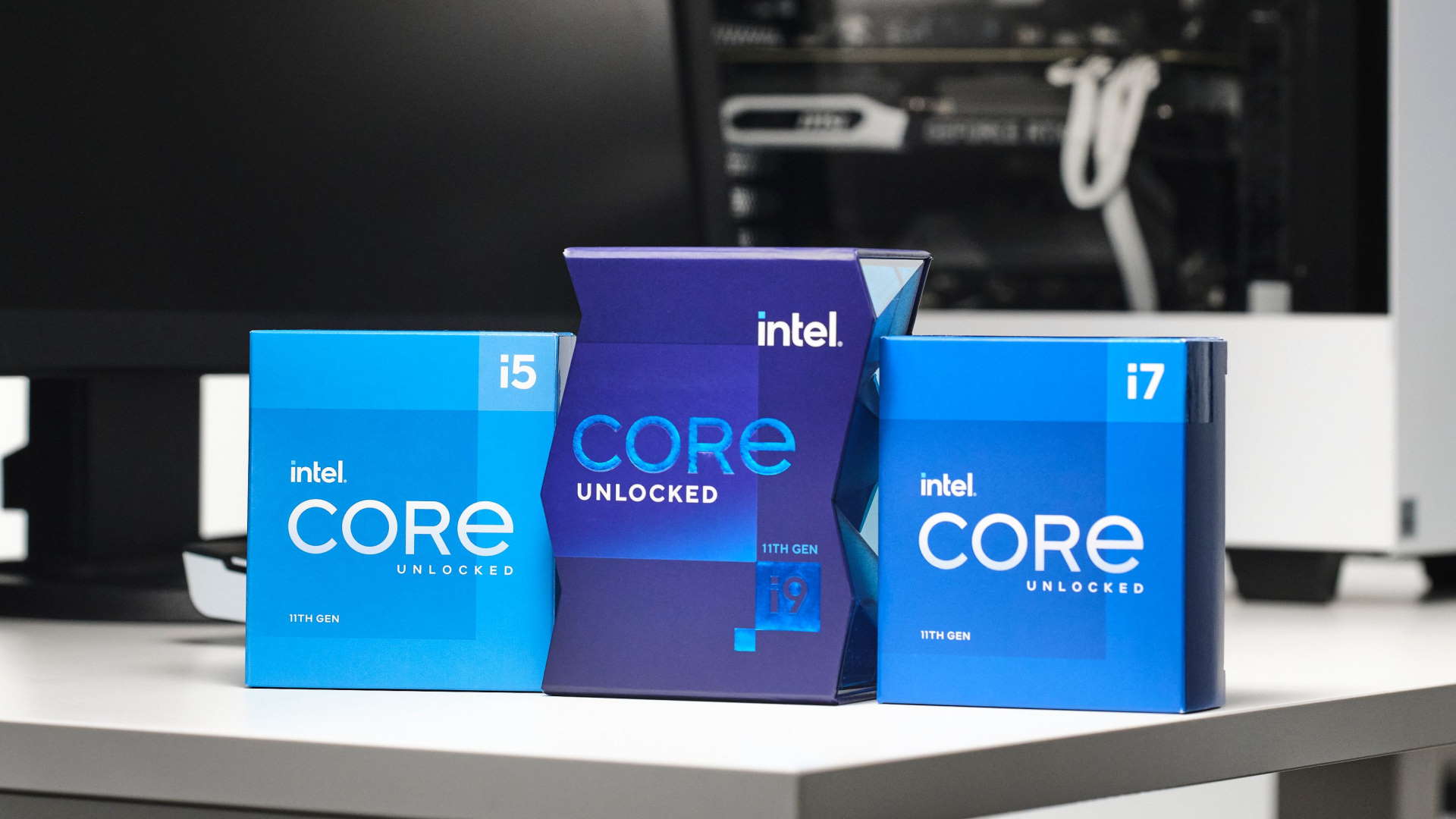
What does the Intel Core i5 11600K mean for PC gaming?
This is now arguably the go-to gaming CPU for 2021. In a world where prices for PC hardware has gotten to ludicrous levels it's incredibly refreshing to find something new which speaks to my price/performance sensibilities.
The popular Ryzen 5 5600X is retailing for around $350, now that there is finally stock of the Zen 3 CPUs again, but the Intel Core i5 11600K is in retail today for just $270. That's an $80 saving for a processor that will comfortably support any graphics card you pair it with and can hold its own against Zen 3 in the productivity stakes too.
It's also got PCIe 4.0 support too, though that is still a little disappointing from a platform and performance perspective at this early stage post-launch.
There's also a pretty healthy ecosystem surrounding it, with affordable Intel 400-series boards that would make a happy home for this 11th Gen CPU if you're happy to give PCIe 4.0 support a pass for now.
It's interesting that as AMD has started to dominate the high end of the processor market, with its Ryzen 9 5900X and Ryzen 9 5950X chips, Intel has gotten more aggressive at the lower end. These last two generations of chips have seen the Core i5 come back as the Intel chips that you'd actually want to drop into your rig if you were on a budget.
Traditionally, that was where AMD was scraping around for a buck in times past, now Intel is clearing up in the volume end of the market.
That $80 pricing delta between the Ryzen 5 and Core i5, however, doesn't make it an absolute slam dunk here for Intel. The 5600X is absolutely the better, more efficient processor, with a solid, mature PCIe 4.0 capable platform to back it up. But in a more normal graphics card market, where a GTX 1650 Super isn't going for $690 in retail, taking that $80 saving and pumping it into your new build's GPU budget will see you go up a performance tier.
And that will bring you a lot more gaming joy.
Verdict
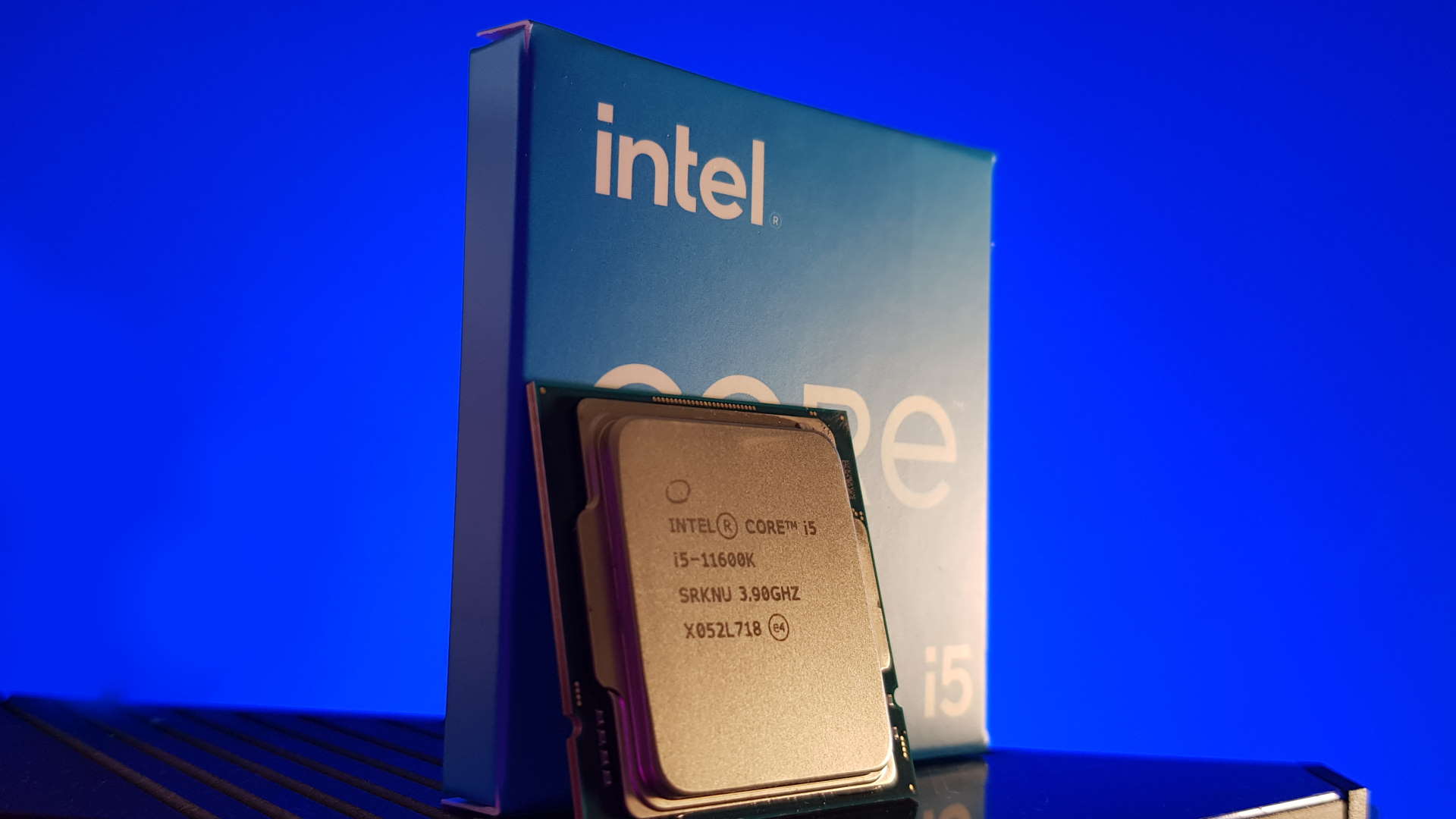
Should you buy the Intel Core i5 11600K?
This, and the cheaper Core i5 11600KF (sans Xe GPU), would be my recommendations for chips to actually buy in the new Rocket Lake CPU range. I'd also be interested to check out the new Core i5 11400 too—another six-core, 12-thread chip that offers a clock speed bump over its bargain-priced last-gen equivalent.
But it's this i5 11600K that really gives AMD's 5600X a run for its money. I'm a penny-pinching kinda guy when it comes to my builds, and the price/performance value of the Rocket Lake chip gives it the edge for me. Sure, it's more power hungry than the Ryzen chip, but be honest with me now, that doesn't really bother you, does it?
So, while the Core i9 11900K is one of my least favourite chips Intel has produced in a long time, the Core i5 11600K is one of my favourites. The modest overclocking I've done pushes it ahead of the AMD silicon, and there is the promise of the PCIe 4.0 platform improving over time. Fine wine indeed.
Ah, sorry, wrong silicon.
Intel's making a real play for the volume end of the market with one of the best Core i5 chips it's released in a long time. The i5 11600K is a great mainstream gaming CPU that can get the most out of any graphics card you can pair it with.

Dave has been gaming since the days of Zaxxon and Lady Bug on the Colecovision, and code books for the Commodore Vic 20 (Death Race 2000!). He built his first gaming PC at the tender age of 16, and finally finished bug-fixing the Cyrix-based system around a year later. When he dropped it out of the window. He first started writing for Official PlayStation Magazine and Xbox World many decades ago, then moved onto PC Format full-time, then PC Gamer, TechRadar, and T3 among others. Now he's back, writing about the nightmarish graphics card market, CPUs with more cores than sense, gaming laptops hotter than the sun, and SSDs more capacious than a Cybertruck.
